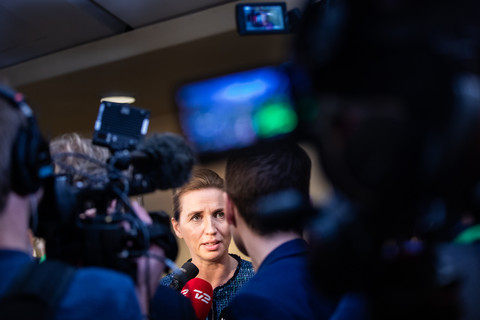[ad_1]

Denmark is stripping Syrians of residency rights, despite EU calls to not deport anyone back to the war-torn country.
The Scandinavian country is the first EU member state to start to revoke residency permits of Syrians, amid recent claims in Denmark that Damascus no longer poses a risk to their return.
The European Commission on Tuesday (13 April) declined to comment specifically on the Danish decisions – noting instead that Denmark must respect “all fundamental rights”.
The EU’s foreign policy chief Josep Borrell, however, last November delivered a more direct message.
He said Syrians that are returned face forced conscription, indiscriminate detention, forced disappearances, torture, physical and sexual violence.
“The limited returns that have taken place illustrate the many obstacles and threats still faced by returning internally displaced persons and refugees,” Borrell said.
Over six million people are currently forcibly dispersed inside Syria, and another 80 percent live below the poverty line.
A recent report by the EU’s Malta-based European Asylum Support Office (Easo) said forced conscription was among the top reasons for Syrians not to return.
In Syria, all males aged 18 to 42 must join the Syrian military.
Exemptions exist, including those residing abroad who can pay up to a $10,000 fee to avoid military service.
However, reports exist of people still getting arrested upon arrival despite having paid the fee.
“In previous years, the exemption fee has been linked with corruption, bribery, and discretionary application,” notes the Easo report.
That assessment contradicts a similar report, this time by the Danish immigration service, which claims that “people who pay the exemption fee have not faced any issues after returning to Syria.”
That conclusion may be linked to Denmark’s shift towards the right when it comes to migration and asylum.
In 2015, it floated the idea of seizing jewellery and other valuables from asylum seekers to offset costs.
More recently, it proposed reforms to reduce the share of “non-Western” people in social housing.
It also stripped 94 refugees of their right to stay in the country, most likely relegating them to camps while awaiting deportations to some other EU state.
It is unlikely they will be sent to Syria because Denmark had closed its embassy there and severed ties with the regime – posing questions on why it would then consider the capital safe.
The response is likely domestic politics.
Although the government is led by the Social Democrats, in a minority coalition of leftwing parties, it has lent heavily on the far-right Danish People’s Party when it comes to migration.
The number of Syrian applicants for asylum in Denmark has since been on a sharp decline.
Over 1,200 Syrians applied in Denmark in 2016, compared to only 340 last year.
With a few exceptions, the trend broadly mirrors those in other EU member states.
Germany, in comparison, went from over 268,000 to 40,555 over the same period.
[ad_2]
Source link